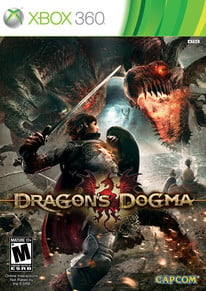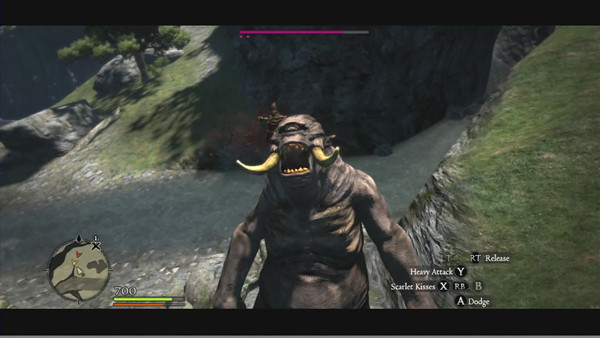Game Review
by Dave Riley,Dragon's Dogma
Xbox 360, PS3
| Description: |  |
||
Become The Arisen, a legendary warrior who survives certain death, and travel the country of Gransys, collecting allies and gaining skills, as you quest to defeat the all-consuming dragon. |
|||
| Review: | |||
You are The Arisen, a silent protagonist who is big and bulky, or small and lithe, or has a funny tattoo, or is pockmarked with scars, depending on your preference. You're on a quest: it's a quest to kill a dragon, as many quests are, but it's a quest made up of a lot of little quests too. Little quests with generic objectives like "kill 15 direwolves" or "get me a golden idol" or "slay this griffin." Together with your NPC sidekick, and a couple party members recruited from other players in a quasi-online kind of way, you travel through a fantasy world, sometimes righting wrongs, but more often bearhugging the leg of a cyclops while your party members pepper it with arrows. Or maybe you're a swordsman, or a mage, or a magic swordsman. Specialize in climbing large enemies or just shoot them with freezing arrows. Enchant your shield to blast out lightning during a counterattack or learn how to double jump and dash-evade attacks instead. It's a system full of interesting quirks: ice spells that create climbable platforms, heavy characters carry more weight while lighter characters are better sprinters, food spoils (unless it's in an airtight container). Throw a flask of water at enemies to intensify lightning damage, throw an explosive barrel at an ore vein to save time mining it. Even the little things, like holding a piece of kindling near a fire to make a torch, shows an astonishing amount of depth. Combat is the most obvious draw. In addition to the usual combination of counters, ranged attacks, and crowd control, anything larger than a goblin (ogres, griffins, chimeras) can be scaled like a tree and stabbed in its joints until it is brought to the ground for easy pickings. They'll fight back: bash you into the ground with clubs, or crush you with a death roll, or try to shake you loose with futile squirms. Certain large monsters stop being boss battles and become regular foes as the game progresses, but there remains a certain thrill in exposing their weak spots, like tricking a cyclops into pawing off its own helmet by clinging to the base of its neck.  Aside from that, it's mostly humdrum people offering humdrum sidequests in humdrum british accents and the story doesn't get good until right before the whole thing ends. There's a dark fantasy aesthetic and an open world to roam around in and it's all very familiar, a game made piecemeal from the parts of half a dozen others (Skyrim, Dark Souls, Shadow of the Colossus). The climbing, and the open world wandering, we've seen that before. If there's anything truly you unique here it's the sense of peril and the sense of place. In most open world games the player quickly learns to ignore the winding paths of man-made roads in favor of cutting faster diagonal routes across countryside. In most open world games the roads are a suggestion, but here they are a necessity, because the wilds are where the cyclops and the lizardmen live. There is an ever-present danger during off-road treks, where there lurks a foul beast, a poison spell, and a quick death. A character in their early levels, controlled by a player used to the laissez faire attitude of the average open world, will find tough going even in the wilderness of their hometown, where goblins and wolves lurk just out of sight of the main road. After a few level-ups off-road journeys become marginally safer, but the night remains a threat. The darkness is all-encompassing, lit only in a small radius by an equippable lantern, and populated by damage-soaking undead and the same large monsters of the daytime, but the low visibility has skewed the odds even further in their favor. Because of the danger, and because of an extremely limited fast travel system, everything feels earned. Each time you, with dwindling supplies and low health, crest the hill northwest of the capital and see its massive walls looming in the distance you will think "I am home" or "I made it." That is a very different experience from opening a map and clicking on an icon to warp back to your village.  But, truth be told, it's mostly fun in aggregate. Exhilarating achievements like "I tricked the seemingly invincible orge into a bottomless pit" or "I encountered a chimera, in the night, while carrying no healing potions, and I won," are weighed down by the moment to moment of "another pack of goblins? really?" Dragon's Dogma's greatest flaw is its repetition. Not only with the goblin packs, who always spawn in the same place, and not only with the quest objectives, which are boring more often than they are not, but even when fighting something huge and impressive like a griffin. The monster soars into the air and you cling to its haunches for dear life. You climb its body mid-flight and plunge your flame-enchanted daggers into its wings, setting its feathers ablaze and sending it crashing to the ground. It's a moment that never gets boring, per se, but do it six times, or twelve times, or twenty times, and it becomes commonplace. It bolsters itself with top-tier combat: fighting monsters is the primary goal instead of busy work, but there's always some niggling detail dragging it down: every time a party member's garbage AI screws up and dies, every time the game sends you on a twenty minute walk back to the same location as the previous quest, you think "why can't this part be better?" This is the sort of game ideal for college kids: people with infinite freetime, but limited money. People who can invest dozens of hours in complicated and obscure game mechanics, who can level nine classes and mix and match their skills, who can dominate an optional boss with millions of hit points. This is sort of game people skip over in favor of Call of Duty, and Mass Effect, and Final Fantasy, the sort of game whose shocking moments of creativity struggle to exculpate it of the lesser sins of slow build-up, and weak storytelling, and repetition. "You have to play it for fifteen hours before it gets good" is an execrable phrase used to excuse bad games. This is not strictly applicable here, not when the first hour involves slicing off a hydra's head, but the game is a slow burn, and the ratio of hydra-heads-sliced-per-hour-played is not as strong as we might like. So Dragon's Dogma slips through the cracks. Everyone has already played Shadow of the Colossus, and Skyrim, and Dark Souls, so what need do they have for this? Well, what this game gets right, really gets right, is grounding you in its world. It takes its giant outdoor space and makes it into a contiguous place instead of a series of checkpoints. By the time the fast travel option becomes readily available it no longer feels necessary. Because, without it, you have learned every nook and cranny of Gransys: the abandoned mine that shortcuts through the mountains, the deep ravine, with sides close enough to jump across, that cuts a minute or two off of your trip.  "You have grown," says the game. Now goblins and wolves can be run past or dispatched at your leisure. You brazenly stride through the bandit encampments that you once gave a wide berth. You go out at night without fear, and you wander away from the road whenever it seems quicker to do so. You have struggled, and you have leveled, and who can challenge you, now that you're so great? You remember the bend in the path where a chimera spawns, and the winding streets leading to the forger's shop, and the all-girl bandit keep that bars your way through the mountains. You remember them all: not because they were checklists on a quest log, even if that was your eventual goal, but because they were actual places. And you remember that hill: that jagged, rocky, blessed hill, the one that crests the water northwest of Gran Soren, above the pack of spear-wielding Saurians that were once so scary you thought you might never cross the river at all. You remember that hill, that wonderful hill, the hill that says "you are home." |
|
The views and opinions expressed in this article are solely those of the author(s) and do not necessarily represent the views of Anime News Network, its employees, owners, or sponsors.
|
| Grade: | |||
Overall : B-
Graphics : B-
Sound/Music : C-
Gameplay : B+
Presentation : B
+ Exceptional combat mechanics, heady sense of exploration |
|||
| discuss this in the forum (10 posts) | | |||